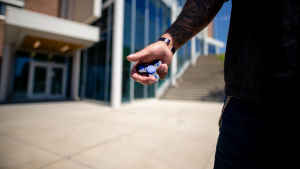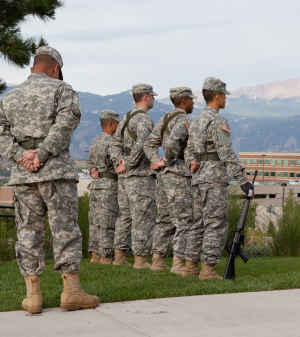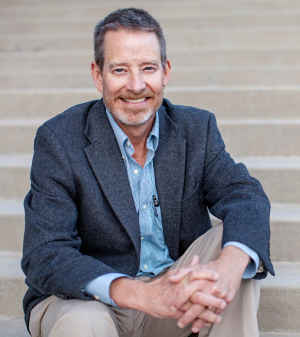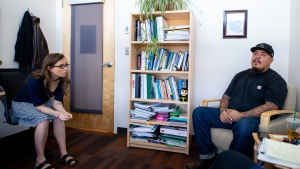
We’re in this together
Empowering trauma survivors through hope
Audio plays during this story.


The fury of war
After a roadside bomb blew up his U.S. Army truck on Hell’s Highway, an infamously dangerous road in Helmand province in Afghanistan, Mike was trapped amid the flames and twisted metal.
"My door was jammed. I couldn't open my door. It was stuck from the blast. They were like, 'Hey, your truck's on fire. You need to get out. You need to get out.' Then that just kind of puts you into a panic."
Mike, a U.S. Army veteran who asked that his last name not be used in this story
"We had to get out. We were getting shot at. It was an ambush. We tried to get the fire extinguisher to put the fire out first. They're shooting at us while we are trying to, you know, because we don't want all of our stuff to burn...We're engaging in a fire fight and trying to put the fire out."
Mike, U.S. Army veteran
Fellow soldiers helped Mike, a squad leader, get out of the burning vehicle. The bomb had thrown him against the windshield knocking him unconscious. Shaken awake by a fellow soldier, Mike found his ears leaking fluid and his jaw locking.
He felt nauseated. He had a headache. He needed a cigarette.
Despite his injuries, Mike and his men immediately began to check the ground underneath them for more bombs.

The threat of death was all around Mike that day in 2016.
Mike received a Purple Heart and a Combat Infantryman Badge.

Mike served in the U.S. Army for nine years and 10 months with two deployments to Afghanistan.
His tools of survival were the instruments of war—guns, bullets, bombs, and on that terrible day, two Apache helicopters and their pilots who protected Mike and his squad from enemy machine guns for hours before they were rescued.

Mike is now fighting new enemies: post-traumatic stress disorder (PTSD) and traumatic brain injury (TBI)—the unwelcome souvenirs of war often diagnosed in combat veterans. His tools of survival: sobriety, hearing aids, weekly counseling appointments, neurofeedback, yoga, rides on his Harley-Davidson motorcycle, the gym, and a fidget spinner that helps quiet his brain and busies his hands.

His comrades today: the University of Colorado Colorado Springs, with organizations that partner to help thousands of U.S. veterans not only survive but thrive, and generous donors who support CU to make sure no one is left behind.

Forged from generosity
Gifts totaling $5.2 million to UCCS established the Veterans Health and Trauma Clinic, located in the Lane Center for Academic Health Sciences, and later expanded the center’s work with TBI research.
The gifts also created a trauma track in the clinical psychology PhD program to serve the health needs of military veterans and other trauma survivors. So far, 12 PhD and five master’s students are enrolled.

Generous gifts from donors help UCCS partner with organizations to meet the significant demand for clinical care and mental health research for veterans in Colorado and beyond.
The need is especially significant in El Paso County, where 125,000 veterans call home.

Psychology Professor Charles “Chip” Benight has focused his career on serving those who are suffering.

"There’s such strong support for veterans here in the community. This was like seeing what can happen when a community wraps around an individual and helps them. For me, it was really trying to make a difference in trauma survivors' lives around how to get them back on their feet."
More than 80% of people will experience at least one traumatic event in their lifetime, according to research. Some people will experience PTSD, which can include flashbacks, avoidance, negative thoughts and moods, and hyperactivity that can significantly affect their daily lives.
Approximately 15% to 20% of returning veterans experience clinically significant post-traumatic stress, Benight says. His clinic’s approach focuses on resilience—the strengths which people can use to assist and empower them in their recovery—rather than viewing trauma survivors as sick and impaired.

Benight serves as director of the UCCS Trauma, Health, and Hazards Center, which houses the clinic. Since 2014, the clinic has treated 1,047 active military personnel and veterans and made more than 28,000 contacts with patients who have endured trauma.

"We're basically saving lives. It's taking people and giving them mental health care that they desperately need. I think they deserve that and that they're getting the right kind of care enables these individuals to become contributing citizens to the community again."
For example, the clinic provides evaluation services for El Paso County’s veteran trauma court, an alternative to incarceration for U.S. military veterans and active duty military who are in the legal system because of trauma-related issues. Thanks to treatment, close probation supervision and regular drug testing, this program helps reduce recidivism and increase public safety.
The clinic also partners with community organizations across the state and nation, like Headstrong based in New York and Operation TBI Freedom of Craig’s Hospital in Colorado Springs. Both address veterans’ health needs, especially for those who served after 9/11.
Since 2012, Headstrong has provided free and confidential mental health treatment for post-9/11 veterans and their families in an effort to eradicate possible barriers like high costs, bureaucracy and stigma. In partnership with Weill Cornell Medicine, Headstrong uses individually tailored and comprehensive treatment programs for PTSD and related military trauma.
Headstrong works in 25 markets around the country, contracting with more than 100 psychotherapists. In Colorado, Headstrong supports 154 clients in trauma treatment—93 in Colorado Springs, 48 in Denver and 13 in Boulder—making the Centennial State its largest market.

"We have just the best relationship with UCCS. They are great at what they do, and they allow us to provide the funding, the clients and the support necessary to create an experience for the veterans that I don't think they would have had otherwise. The synergy between Headstrong and UCCS is an example of a great partnership."
Gerard Ilaria, Headstrong clinical director
Twenty veterans a day die by suicide. They comprise 14% of all suicides, even though veterans only make up 8% of the U.S. population.

On the homefront
Mike contacted Headstrong after he medically retired from the U.S. Army in late 2018.
His war wounds, both hidden and visible, ended what Mike had hoped would be a long military career.

"It was hard, super hard for me to ask for help. I was embarrassed to ask for help. My mentality was I'm going to be a lifer in the Army and, you know, be someone big in the military, do something like that. It got cut short because of my injuries that happened in Afghanistan."
Mike, U.S. Army veteran

Within 48 hours of completing an online form, Mike was on the phone with a psychiatrist from Headstrong for an evaluation.
Ultimately, they connected Mike with Erin Fowler, a UCCS clinician at the Veterans Health and Trauma Clinic whose expertise is counseling combat veterans just like him.

After months of dealing with suicidal ideation, rage, and alcohol and substance abuse issues, Mike had a lifeline. Mike has lost fellow soldiers he served with to suicide.
This year he almost joined them.

Partnerships like the one between Headstrong and UCCS are important because the availability and urgency needed for mental health services, especially for veterans, cannot always meet demand.
Those who need help can sometimes face restrictions, privacy issues, stigma, high costs or long waitlists for mental health services from traditional sources.

Mike is proud that he served his country. He is embracing his identity as a veteran and mastering the tools given to him by the Veterans Health and Trauma Clinic at UCCS.
He wants to be a better father to his two kids. He talks now with friends and family about therapy. He wants to break down the stigma around mental health and encourage other veterans to seek help if they need it.

"It feels good...to know that there's people out there that care about us. The peace I get is maybe one [veteran] might read this and be like, ‘You know what, let's go try therapy.’ That to me is worth it."
Mike, U.S. Army veteran

In 2020, Benight is launching a new National Resilience Institute at UCCS to help survivors of all types of trauma like car crashes, sexual assault, natural disasters, mass shootings and, of course, combat.
Here, survivors can seek a strength-based approach to trauma care and recovery through hope and healing, not just managing their symptoms.

"We need to think about people more holistically and help them generate a sense of recovery through their own empowerment. What we really focus on is to identify the strengths that individuals have in the aftermath of a trauma, and then help them with processing and moving forward after they've gone through probably one of the most horrific things they've ever gone through. We're a place where people can find a way forward, really."


